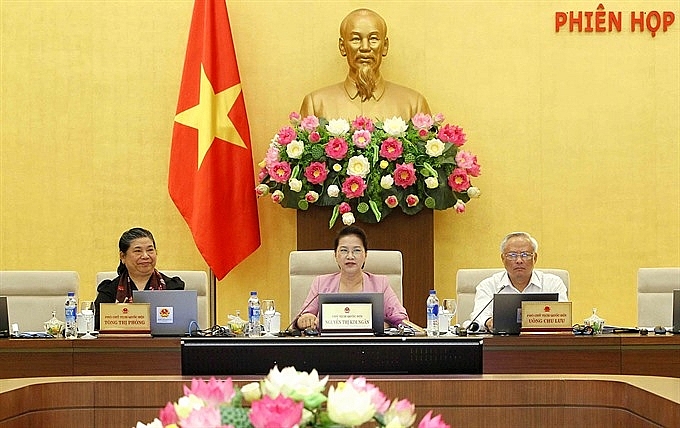Lawmakers still split over tax on unexplained assets
 |
| National Assembly Chairwoman Nguyen Thi Kim Ngan (middle) and vice chairs presided over yesterday’s meeting of the NA Standing Committee regarding the draft anti-corruption bill. - VNA/VNS Photo Van Diep |
According to the draft bill, officials who failed to provide proper accounts of or wrongly declared their assets and income would be required to pay a 45 per cent tax.
The proposal has met with diverging opinions amongst lawmakers and the public, with many fearing the tax might legitimise the holding of corrupt assets and calling for confiscation instead.
Presenting the bill at the meeting, Le Minh Khai, head of the Government Inspectorate, the agency in charge of drafting the revised bill, said there were six options for handling unexplained assets: criminal proceedings, civil proceedings, administrative fines, administrative – judicial fines, collecting individual income tax, and finally, means provided by existing law.
Khai added that even paying tax on the unexplained assets won’t mean being acquitted from further legal proceedings if the assets are discovered to be of illegal origin.
A report from the NA Judicial Committee, reviewer of the draft bill, said that collecting individual tax income is an option with many merits.
“It meets the demands of the fight against corruption, fits the country’s current situation and proves to be the most viable option,” Le Thi Nga, head of the judicial committee, said.
However, many lawmakers remain unconvinced of the drafter’s reasoning behind the choice of imposing a 45 per cent tax on unexplained assets in the draft bill.
Tran Cong Phan, deputy chief of the Supreme People’s Procuracy, argued that all the options are difficult to implement, calling the proposal “baseless.”
“It must be stressed that tax is only put on legal income. If the origin of the assets cannot be sufficiently explained, they could either be legal or illegal. If we collect tax on these assets, and later they are found to have been illicitly obtained, criminal proceedings would surely face a lot of issues,” Phan said.
Therefore, Phàn proposed that for those officials who have improperly declared their assets, the first step is to carry out disciplinary measures and the second is to investigate the assets and then transfer the case to either the tax authorities or criminal police, depending on the nature of the violation.
Deputy finance minister Do Hoang Anh Tuan contended that the option of imposing tax on unexplained or improperly declared assets is “legally sound.”
Tuấn said the proposed 45 per cent tax rate was calculated based on the current tax rate on irregular income and late tax payment penalties.
NA Chairwoman Nguyen Thi Kim Ngan said the draft law had received special attention throughout two NA plenary sessions.
Most major issues, including determining which agency would be responsible for monitoring officials’ income and assets, and expanding the scope of anti-corruption work beyond the public sector, were relatively settled, she said.
However, the bill author’s explanation for the 45 per cent individual tax levied against unexplained assets was “unpersuasive,” NA Chairwoman Ngan said.
She suggested that after the 25th session ends, concerned authorities should continue to study international experiences and incorporate feedback from the central steering committee on anti-corruption to complete the draft law.
What the stars mean:
★ Poor ★ ★ Promising ★★★ Good ★★★★ Very good ★★★★★ Exceptional
 Tag:
Tag:
Related Contents
Latest News
More News
- Tet event in Japan celebrates success of 14th National Party Congress (January 25, 2026 | 10:04)
- 14th National Party Congress wraps up with success (January 25, 2026 | 09:49)
- Congratulations from VFF Central Committee's int’l partners to 14th National Party Congress (January 25, 2026 | 09:46)
- List of newly-elected members of 14th Political Bureau announced (January 23, 2026 | 16:27)
- 14th Party Central Committee unanimously elects To Lam as General Secretary (January 23, 2026 | 16:22)
- List of members of 14th Party Central Committee announced (January 23, 2026 | 09:12)
- Highlights of fourth working day of 14th National Party Congress (January 23, 2026 | 09:06)
- Press provides timely, accurate coverage of 14th National Party Congress (January 22, 2026 | 09:49)
- Press release on second working day of 14th National Party Congress (January 22, 2026 | 09:19)
- Minister sets out key directions to promote intrinsic strength of Vietnamese culture (January 22, 2026 | 09:16)






















 Mobile Version
Mobile Version